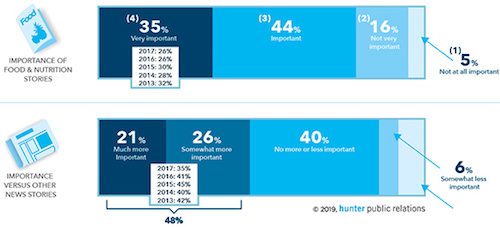More Americans now consider food and nutrition news to be more important than any other type of news, according to the annual Food News study commissioned by New York agency Hunter Public Relations.
Hunter’s annual study, which surveys consumers on their opinions regarding the most memorable food-related news items each year and what impact or behavioral changes these stories provoke, found that the importance of food news surged among Americans last year, marking the highest levels seen in more than a half-decade when compared to previous studies.
More than a third of respondents (35 percent) said they consider food and nutrition stories to be very important, and nearly half (47 percent) said they think food and nutrition news is more important than any other type of news. This sentiment was notably high among members of the Millennial and Gen Z generations, where 83 percent said they consider food news to be very important and 64 percent said they find these stories to be more important than other news.

Headlines involving food safety and recalls are always popular items, and last year proved no exception. A majority of respondents (44 percent) said they now consider food safety news to be the most important food-related topic, and two items from 2018’s most memorable food-related headlines (the romaine lettuce recalls and the FDA’s suspicions that contaminated whey was the culprit in 2018’s salmonella-related recalls) made the list. According to the survey, food safety news is also typically associated with the strongest changes in behavior and is often associated with some of the strongest changes made in consumer opinion.
The second most important food-related topic addressed in 2018 involved food nutrition/health & wellness (23 percent). These items were most often associated with reported changes in opinion.
Finally, the study noted that many of 2018’s top food stories appeared to be uniquely sharable in design, either via social media or in daily conversation among friends, family or coworkers. Some of the highest-ranking food stories, such as the national outrage provoked by the April 2018 racial profiling incident at a Philadelphia Starbucks and the effects Chinese tariffs are having on U.S. farmers, were cited by the study for their “water cooler” potential—topics Americans talk about or are more likely to be shared via social media alongside photos or personal comments.
Nearly half of Americans (47 percent) said they regularly share their food experiences via social media. However, this behavior surges to nearly three in four (74 percent) when respondents identify themselves as being part of the Millennial or Gen Z generations.
The most popular food-related news stories for 2018 were as follows:
1. Plastic Straw Bans
2. Dunkin’ Donuts Name change to Dunkin’
3. Romaine Lettuce Recall
4. Racial Profiling at Starbucks Spurs Outrage
5. China Tariff Impacting U.S. Farmers
6. Online Grocery Shopping Booms
7. Cannabis-infused Food & Beverage
8. Should Plant-Based “Milk” (Almond, Soy, etc.) Really be Called Milk?
9. FDA Suspects Contaminated Whey is Culprit in Salmonella-Related Recalls
10. Launch of Mayochup
A majority of respondents (86 percent) said they were aware of at least one of these food-related news items last year, and about half of them were compelled to either change their opinion, behavior or share these stories with others.
Hunter’s Food News Study, now in its 16th year, was conducted in partnership with Libran Research & Consulting, and surveyed more than 1,000 U.S. residents between October and early November.
Hunter will host a free webinar next Wednesday (1/30) on a segmentation study developed from its Food News Study data. Those interested in accessing the webinar can register here.


 What the biggest meal of the day can teach us about serving up effective nutrition communications campaigns.
What the biggest meal of the day can teach us about serving up effective nutrition communications campaigns. Tips to refine and amplify your CPG brand strategy to win in 2024 and beyond.
Tips to refine and amplify your CPG brand strategy to win in 2024 and beyond. Strategic communications strategies for success in the growing “food is medicine” movement.
Strategic communications strategies for success in the growing “food is medicine” movement. How brands can authentically communicate sustainability issues and create a brand experience that’s compatible with consumers’ values.
How brands can authentically communicate sustainability issues and create a brand experience that’s compatible with consumers’ values. Communicating the effects that climate change and a growing world population have on our food system—and why change is needed.
Communicating the effects that climate change and a growing world population have on our food system—and why change is needed.


 Have a comment? Send it to
Have a comment? Send it to 
No comments have been submitted for this story yet.